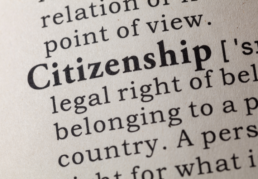Birthright citizenship is a fundamental part of what defines American identity, ensuring that anyone born on U.S. soil is automatically a citizen, no matter their parents’ status. Grounded in the 14th Amendment, this principle embodies the nation’s values of equality and inclusion. However, in recent years, it has become a topic of intense debate, with some political figures questioning its validity and pushing for changes.
What is birthright citizenship?
In the U.S., children obtain their citizenship at birth through the legal principle of jus soli (“right of the soil”)—that is, being born on U.S. soil—or jus sanguinis (“right of blood”)—that is, being born to parents who are United States citizens.
The 14th Amendment is more than just a line in the Constitution—it’s a powerful symbol of American freedom and equality. It guarantees that anyone born on U.S. soil is automatically a citizen, a principle that has shaped our country’s identity for over 150 years. Recently, though, President-Elect Donald Trump suggested he wants to end birthright citizenship.
Section 1 of the 14th Amendment contains the birthright citizenship clause. “All persons born or naturalized in the United States, and subject to the jurisdiction thereof, are citizens of the United States and of the State wherein they reside.” Birthright citizenship contrasts with U.S. citizenship obtained through naturalization or acquisition—citizenship granted by virtue of being born abroad to at least one U.S. citizen parent.
Can a president take away birthright citizenship?
The main argument often heard from conservatives is that granting citizenship to children of parents who entered the country illegally undermines U.S. sovereignty and incentivizes abuse of the immigration system. Former President Donald Trump has been a vocal opponent of birthright citizenship and now claims he can end it with an executive order. But can he? Most constitutional scholars argue that he cannot—or, if he does attempt it, that the courts will likely overturn his order.
The principle of birthright citizenship—granting citizenship to those born within the United States—is enshrined in the Constitution. It is stated in the first sentence of the 14th Amendment: “All persons born or naturalized in the United States and subject to the jurisdiction thereof are citizens of the United States and of the State wherein they reside.” This provision cannot be altered by executive order or legislation; it can only be changed by amending the Constitution.
The 14th Amendment was designed to solidify the common-law rule of birthright citizenship and to ensure citizenship for people of African descent and their descendants, who had been brought to the United States as slaves. The nation fought a civil war over this issue, and in 1868, this language was added to the Constitution to explicitly overturn the pre-Civil War Supreme Court decision in Dred Scott v. Sandford. The president does not have the constitutional authority to change the 14th Amendment’s unmistakable meaning or purpose.
Largely, Trump can try to issue an executive order, but under long standing Supreme Court precedent, it would be invalid. Trump may be banking on the Supreme Court to change its interpretation of the 14th Amendment to permit him to circumvent it via executive order, but that is unlikely given its clear language.
Can state governments take away birthright citizenship?
No, state governments don’t have the power to take away birthright citizenship. The 14th Amendment to the U.S. Constitution guarantees that anyone born in the United States is a citizen, and this applies across all states. Because this right is in the Constitution, it’s protected nationwide, and individual states can’t override it.
Only the federal government could change birthright citizenship, either through a constitutional amendment or a Supreme Court decision—it’s out of the states’ hands. Any state attempt to deny birthright citizenship would almost certainly be ruled unconstitutional in court.
Amending the Constitution to change birthright citizenship would be a challenging and lengthy process, requiring significant support at both the federal and state levels.
Here’s how it would work:
Proposal Stage: The amendment must be proposed either by:
- A two-thirds vote in both the House of Representatives and the Senate; or
- Constitutional convention called by two-thirds (34 out of 50) of the state legislatures (this method has never been used).
Ratification Stage: Once proposed, the amendment then needs to be ratified. This can happen in one of two ways:
- Approval by three-fourths (38 out of 50) of state legislatures; or
- Ratification by special conventions in three-fourths of the states (though this method has only been used once, for the 21st Amendment).
Since the 14th Amendment is a core component of the Constitution and was specifically designed to protect citizenship rights, it would require broad political and public support to amend it. The high thresholds at both the proposal and ratification stages mean that changes to birthright citizenship through a constitutional amendment would be difficult to achieve and would likely face extensive debate.
At Berardi Immigration Law, we specialize in navigating complex immigration issues with clarity and expertise. Whether you’re seeking guidance on citizenship, visa applications, or compliance matters, our team is here to help you every step of the way. Contact us today to learn how we can assist with your immigration needs!
Ready to have Berardi on your side?
Whether you’re a business looking to hire or a professional hoping to relocate, immigration law can be complicated. But you don’t have to do it alone. Put our experience to work for you.



